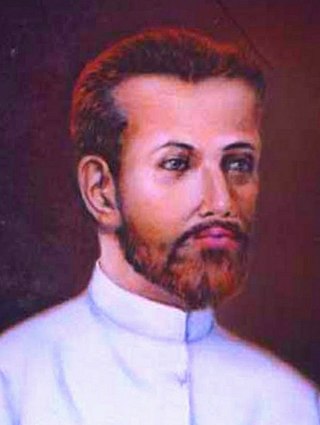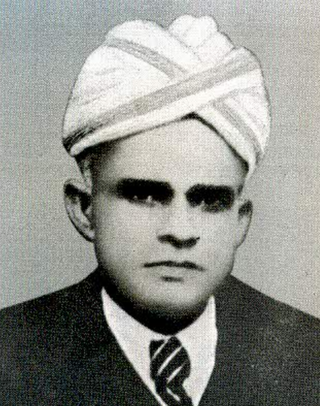Related Research Articles
Old English literature refers to poetry and prose written in Old English in early medieval England, from the 7th century to the decades after the Norman Conquest of 1066, a period often termed Anglo-Saxon England. The 7th-century work Cædmon's Hymn is often considered as the oldest surviving poem in English, as it appears in an 8th-century copy of Bede's text, the Ecclesiastical History of the English People. Poetry written in the mid 12th century represents some of the latest post-Norman examples of Old English. Adherence to the grammatical rules of Old English is largely inconsistent in 12th-century work, and by the 13th century the grammar and syntax of Old English had almost completely deteriorated, giving way to the much larger Middle English corpus of literature.

Malayalam is a Dravidian language spoken in the Indian state of Kerala and the union territories of Lakshadweep and Puducherry by the Malayali people. It is one of 22 scheduled languages of India. Malayalam was designated a "Classical Language of India" in 2013. Malayalam has official language status in Kerala, Lakshadweep and Puducherry (Mahé), and is also the primary spoken language of Lakshadweep and is spoken by 35 million people in India. Malayalam is also spoken by linguistic minorities in the neighbouring states; with a significant number of speakers in the Kodagu and Dakshina Kannada districts of Karnataka, and Kanyakumari, Coimbatore and Nilgiris district of Tamil Nadu. It is also spoken by the Malayali Diaspora worldwide, especially in the Persian Gulf countries, due to the large populations of Malayali expatriates there. They are a significant population in each city in India including Mumbai, Bengaluru, Delhi, Kolkata, Pune etc. Malayalam is closely related to the Tamil language.

Malayalam, the lingua franca of the Indian state of Kerala and the union territories of Lakshadweep and Puduchery, is one of the six classical languages of India. Malayalam literature comprises those literary texts written in Malayalam, a South-Dravidian language spoken in the Indian state of Kerala. The first travelogue in any Indian language is the Malayalam Varthamanappusthakam, written by Paremmakkal Thoma Kathanar in 1785. Malayalam literature has been presented with 6 Jnanapith awards, the second-most for any Dravidian language and the third-highest for any Indian language.
Indian literature refers to the literature produced on the Indian subcontinent until 1947 and in the Republic of India thereafter. The Eighth Schedule to the Constitution of India has 22 officially recognised languages. Sahitya Akademi, India's highest literary body, also has 24 recognised literary languages.
A classical language is any language with an independent literary tradition and a large body of ancient written literature.

Thunchaththu Ramanujan Ezhuthachan was a Malayalam devotional poet, translator and linguist. He was one of the prāchīna kavithrayam of Malayalam literature, the other two being Kunchan Nambiar and Cherusseri. He has been called the "Father of Modern Malayalam", the "Father of Modern Malayalam Literature", and the "Primal Poet in Malayalam". He was one of the pioneers of a major shift in Kerala's literary culture. His work is published and read far more than that of any of his contemporaries or predecessors in Kerala.
The Malayali people are a Dravidian ethnolinguistic group originating from the present-day state of Kerala in India, occupying its southwestern Malabar coast. They form the majority of the population in Kerala and Lakshadweep. They are predominantly native speakers of the Malayalam language, one of the six classical languages of India. The state of Kerala was created in 1956 through the States Reorganisation Act. Prior to that, since the 1800s existed the Kingdom of Cochin, the Kingdom of Travancore, Malabar District, and South Canara of the British India. The Malabar District was annexed by the British through the Third Mysore War (1790–92) from Tipu Sultan. Before that, the Malabar District was under various kingdoms including the Zamorins of Calicut, Kingdom of Tanur, Arakkal kingdom, Kolathunadu, Valluvanad, and Palakkad Rajas.

Johann Ernst Hanxleden (1681–1732), better identified as Arnos Pathiri, was a German Jesuit priest and missionary, best known for his contributions as a Malayalam and Sanskrit poet, grammarian, lexicographer, and philologist. He lived in India for most part of his life and became a scholar of Sanskrit and Malayalam languages before authoring Puthen Pana, a poem on the life of Jesus Christ, Malayalam–Portuguese Dictionary, the first dictionary in Malayalam as well as two linguistic treatises, Malayalavyaakaranam and Sidharoopam.
Kanakku Chembakaraman Kesava Pillai (1868–1914) was an Indian composer of Carnatic music and a poet of Malayalam literature. He was the Poet Laureate of Travancore and was known for Kesaveeyam, a mahakavya in Malayalam, two attakathas and several bhajans and kirtans. He also translated the Sanskrit text, Narayaniyam, into Malayalam under the title, Bhashanarayaniyam.

Ulloor S. Parameswara Iyer, born Sambasivan but popularly known as Ulloor, was an Indian poet of Malayalam literature and a historian. He was one of the modern triumvirate poets of Kerala in the first half of the 20th century, along with Kumaran Asan and Vallathol Narayana Menon. Umakeralam, a mahakavya, and Kerala Sahitya Charitram, a comprehensive history of the Malayalam language are two of his most important works.
Kattakayam Cherian Mappillai (1859–1936) was an Indian poet and playwright of Malayalam literature. He was known for the epic poem Shreeyeshu Vijayam, which earned him the title of Mahakavi. He was the founder editor of Vijnaana Rathnaakaram, one of the earliest literary magazines in Malayalam language. Pope Pius XI presented him a gold medal in 1931.
Malayalam poetry is poetry written, spoken, or composed in Modern, as well as Old and Classical, Malayalam.
The three Pracheena Manipravala Champu poems are Unniyachi Charitham, Unniyadi Charitham and Unni Chiruthevi Charitham.
Cherusseri Namboothiri is a 15th-century Malayalam poet who belonged to Kolathunadu, in present-day North Malabar region of Kerala. He was a court poet of Udaya Varma (1446–1475) and the author of Krishna Gadha, a poem which is considered a landmark in the development of Malayalam literature.
Uli Sandam is among the oldest works in Malayalam language. It is a sandesa kavyam, a message written in poetry, on the lines of the famous Meghadūta of Kalidasa. In the case of this work, it is a message written by a lover to his lady-love staying at a far-off place. The message is therefore written as if it is sent through a messenger. The work was written in the 14th century AD, when transport and communications were very limited in Kerala. The messenger in the poem is, therefore, a carrier pigeon. Apart from the message proper, the poem gives detailed instructions to the messenger pigeon, including the route to be taken and the landmarks in route.

Mongolian literature is literature written in Mongolia and/or in the Mongolian language. It was greatly influenced by and evolved from its nomadic oral storytelling traditions, and it originated in the 13th century. The "three peaks" of Mongol literature, The Secret History of the Mongols, Epic of King Gesar and Epic of Jangar, all reflect the age-long tradition of heroic epics on the Eurasian Steppe. Mongol literature has also been a reflection of the society of the given time, its level of political, economic and social development as well as leading intellectual trends.

P. K. Narayana Pillai, better identified as Sahitya Panchanan P. K. Narayana Pillai, was an Indian literary critic, essayist, scholar, grammarian and poet of Malayalam language. One of the pioneers of literary criticism in Malayalam, he wrote more than 25 books which include Panchananante Vimarssthrayam, a critique of the writings of Thunchaththu Ezhuthachan, Cherusseri Namboothiri and Kunchan Nambiar and two books on Malayalam grammar, Leghuvyakaranam and Vyakarana Pravesika. He was a judge of the High Court of Kerala, a member of the Sree Moolam Popular Assembly and the founder president of the Samastha Kerala Sahithya Parishad.
Middle Malayalam is the period of the Malayalam language spanning from 13th century to 15th century AD.
Unnichiruthevi Charitam is one of the ancient Manipravalam written during the Middle Malayalam period. Unnichiruthevi, the daughter of a dancer named Rayarambilla is the heroine in it. In the poem, Devendran comes to earth, falls in love with Unnichiruthevi, and reaches her house after seeing the sights. Unnichiruthevi Charitham, which is written between the 13th century to 15th century AD has its place in various fields like language, literature, and social and national history. It is one of the oldest works in Malayalam and is considered a work that reflects the social history of the time it was written.
Chathanath Achuthanunni is a polyglot, Malayalam language writer and translator from Kerala, India. He received many awards including Kerala Sahitya Akademi Award for Overall Contributions (2011) Kerala Sahitya Akademi Award (1987) and Sahridayavedi Award (1988). In 2022 he received the Sahitya Akademi Translation Prize, a literary honour in India, presented by Sahitya Akademi, India's National Academy of Letters.
References
- ↑ Menon, A. Sreedhara (2007-01-01). Keralacharithram (in Malayalam). DC Books. ISBN 978-81-264-1588-5.
- ↑ Tarakan, Ke Eṃ (1990). A Brief Survey of Malayalam Literature: History of Literature. K.M. Tharakan.
- ↑ നാരായണപിള്ള, പി കെ (എഡി ) (1949). Unniyachee Charitham.
- ↑ admin. "ഉണ്ണിയച്ചീചരിതം". Keralaliterature.com. Retrieved 2023-02-25.
- ↑ "ദേവദാസികള്: കേരളത്തിനുമുണ്ട് കഥ പറയാന് (പ്രതികരണം ) – Sneha Samvadam – Magazine- Niche of truth – Magazine". old.snehasamvadam.org. Retrieved 2023-02-25.
- ↑ Nair, Puravarikkal Krishnan (1973). ഉണ്ണിച്ചിരുതേവീചരിതം: പാഠപരിശോധനചെയ്തു പരിഷ്ക്കരിച്ചത് (in Malayalam). Kr̥ṣṇannāyar.
- ↑ കുഞ്ഞന് പിള്ള, ശൂരനാട്ട് (1956). കാവ്യരത്നാകരം (in Malayalam).